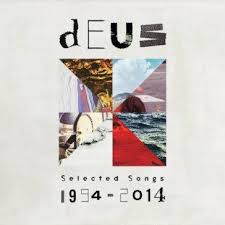dEUS are one of the Great Lost 90s Bands. Okay, so depending on where you’re from, the ’90s label may not be entirely accurate. dEUS’s output does indeed continue to this day. And while in the UK their earlier work garnered just a modicum of attention, the Antwerpers rose to super-stardom in their home country of Belgium after a five year hiatus and a notable switch in style. As far as the Anglosphere is concerned though, little else solicits a widening of the eyes and a chinking of glasses quite like a discovered mutual fondness for this band.
With a shifting line-up revolving around vocalist Tom Barman and violinist/keyboardist Klass Janzoons, dEUS started out as an eccentric jazz-blues infused art-rock combo. Clutching copies of Troutmask and propping up the bar in gin-soaked suits, they shared their influences’ love of the bizarre and the macabre – wet-eyed encounters in shabby hotel lounges, tall tales sung in Barman’s smoky whisper of a voice. Their style veered from the wee small hours acoustica of ‘Little Arithmetics’ to the RATM-with-fiddles folk-punk screamathon, ‘Suds And Soda’. Charles Mingus’ ‘Far Wells, Mill Valley’ was slowed down to a crawling loop for swampy blood chant ‘Theme From Turnpike’. And like their idol, Tom Waits, dEUS weren’t beyond the kind of arch-sentimentality heard on Henson-esque musical numbers like ‘Disappointed In The Sun’.
This first phase saw a maverick approach to convention and form; the band even going so far as to release a limited-edition experimental album titled My Sister = My Clock, which took their fondness for studio and tape-loop trickery well beyond their already offbeat style.
By their third album proper, 1999’s The Ideal Crash, they had all but lopped off their more outrageous tendencies, opting for a more solid, mainstream sound. This era spawned the classic single ‘Instant Street’, their biggest hit up until then. Soon afterwards dEUS left the scene, releasing only the wistful ballad ‘Nothing Really Ends’ before returning in 2005 with a new line-up and a significantly different stadium-friendly rock sound. Although this change in style did little to reignite much passion among UK audiences, the second era spawned four number 1 albums and a number 2 hit single with ‘The Architect’ in their home country.
The aforementioned songs all feature on Selected Songs 1994-2014, a career spanning double disc of cuts plucked from all seven of their studio albums. There’s also a live version of the song ‘Sun Ra’ thrown-in as a showcase for dEUS’s formidable performance-work. Starting with the big hits and running through a liberally-arranged selection of singles and highlights, what’s staggering is how immediate dEUS could be as songwriters. ‘Instant Street’s plucked banjo riff and "put on a movie/play something groovy" line is just as charming and catchy as it ever was. Meanwhile, the splintered funk of ‘Fell Off The Floor, Man’ comes into its own, as hot-pants and tin-pans take a surprising left-turn into full-throttle acid-rock. While this writer had previously written-off the band’s later AOR-phase, he has to admire the way ‘The Architect’ somehow manages to redefine the grunt and heave of Miles Davis’ On The Corner, repurposing its vibe into an infectious robotic chant-a-long.
It’s these little inventive moments that make dEUS such a unique bunch. Whether you’re a fan of the earlier art-blues era or the later euro-rock phase, there’s no argument for a better selection, really. That said, newcomers may be left with a disorienting impression on hearing these songs for the first time. The decision to order tracks in non-chronological sequence means we get big shimmery pop numbers like ‘Constant Now’ bumping up against the maudlin hat & beard of ‘Hotellounge (Be The Death Of Me)’. Rather than emphasising the variety on offer, this approach has a peculiar homogenising effect on dEUS’s back catalogue.
On the plus side, we’ve no choice but to take in dEUS as a whole – not just as forgotten indie heroes, nor European rockstars. Heard in isolation, the later songs feel more vibrant than in the context of their original albums. Going back to albums like 2008’s Vantage Point confirms this – the band’s diversity and playfulness replaced by a solid, aseptic sound reminiscent of dour alt-rockers like The National or Editors. So while songs like ‘Slow’ and ‘Quatre Mains’ do well to convey that mood of nocturnal menace dEUS had always hinted at, these are still among the least interesting moments on the compilation.
Meanwhile, the earlier era suffers slightly from a general pruning of dEUS’ more eccentric tendencies. It’s a flattening effect common to best-of compilations, where the big defining songs are removed of their characteristic, surrounding foibles. Albums like 1994’s Worst Case Scenario and 1996’s In A Bar Under The Sea were wonderfully calamitous affairs – bumpy rides, in all. A sweet pop song like ‘Little Arithmetics’ would have proved welcome respite following the collage-style bombardment that made-up the first four tracks on In A Bar Under The Sea. On this collection, however, ‘Little Arithmetics’ is "just" another great single.
What we’re missing are the bits in between – creepy sea shanties like ‘A Shocking Lack Thereof’; the late-night blues of ‘Nine Threads’; terrifying dark-jazz b-sides like ‘My Little Contessa’; not to mention the crazed tape experiments on My Sister = My Clock. While it’s no surprise these lesser cuts were left off, they nevertheless represent an essential part of the dEUS make-up.
All told, given the capacity of two CDs, it would be impossible to present dEUS any other way. This is a fantastic collection of songs, and while their more outré tendencies are less obviously felt, there’s scope enough to encompass the sheer variety dEUS can offer.
<div class="fb-comments" data-href="http://thequietus.com/articles/16712-deus-selected-songs-1994-2014-review” data-width="550">


